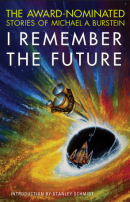An Interview with Michael A. Burstein
Author of
I Remember the Future
Why do you write short stories?
Because I love reading short stories. For me, the short story is the most satisfying form of fiction. Every word of a short story has to carry the reader into an unfamiliar world and tell an enthralling story. There’s no room for wasted words or thoughts.
How important is the short story in science fiction?
In many ways, the short story is even more important than the novel. Often, cutting edge ideas are more accepted by the short story reader than they are by the novel reader. And as a market, the short story continues to be vital. If there hadn’t been a thriving market for short stories, we wouldn’t have seen Isaac Asimov, Robert A. Heinlein, and Arthur C. Clarke become the famous writers that they did, as they all got their start with short stories.
What do you think of the boom in science fiction in films and on television?
I think it’s a wonderful thing. But I think people ought to know that many of the ideas and concepts they see in the movies were first developed in the pages of short stories.
Can you give an example?
Easily. The planet Coruscant in the Star Wars movies, for example, is a direct homage to the planet Trantor that Isaac Asimov created in the Foundation series for the magazine Astounding. Both are galactic capitals that developed into one large city covering the entire surface of the planet. But Asimov’s Trantor predates Coruscant by at least forty years.
What sort of ideas do you explore in your own stories?
Probably my most prevalent theme is the question of how we ourselves will be remembered in the future. “Kaddish for the Last Survivor” is an explicit warning about how slippery history becomes the further we are removed from it. And “Paying It Forward” and my new story “I Remember the Future” are homages to the science fiction writers of the past who created the field.
It sounds as if you’re as interested in the past as you are in the future.
I think my love of time travel is showing. But yes, I’m fascinated with how the past serves as prologue for the present, and how both influence the possible futures to come. And, as I said, I worry about how much the future fails to remember the past. One of the stories in the book, “Time Ablaze,” is about a 1904 steamboat fire in New York City that killed over one thousand people. Almost no one remembers it today, even though it was the worst one-day disaster in New York City’s history until 9/11.
How important is knowing science for a science fiction writer?
On the one hand, I would say it’s rather important. I have two degrees in physics, and I find that my scientific understanding of how the world works has been very helpful when it comes to imagining the advances in science and technology. I regularly keep up with science by reading magazines such as New Scientist, Scientific American, and Discover, as I never know when an unexpected development will lead to a story idea.
But on the other hand, I don’t think anyone should limit their writing due to a lack of knowledge. If you have an idea for a science fiction story but you’re not sure how the science should work, write the story first and then figure out the plausibility later.
That question reminds me of when a friend finished reading “Broken Symmetry” and asked me if one could really use a superconducting quantum interference device (or SQUID) to communicate with a parallel universe. I explained that if I knew the answer to that, I’d be collecting my Nobel prize, not writing stories.
How does your religion influence your work?
One of the things I noticed early on was that much science fiction tends to stay away from religion. I think this goes way back, to the time of H.G. Wells, when a lot of “enlightened”” people felt that science would end up replacing religion. In much of the early pulp science fiction of the 1930s and 1940s, science and rationality have become the new faiths.
But fiction should not remain blind to human reality, and some of the best science fiction stories written have taken the perspective that religion is a valid form of human expression that will continue to exist into the future. Being Jewish, I wanted to explore how someone of my own faith might deal with the existence of another universe, hence the story “Reality Check.” And my interest in the Catholic concept of sanctuary led to my story “Sanctuary,” in which an alien requests sanctuary from a human priest on a space station.
In short, religion is one of those things, like the past, that I love to explore with my stories.
Finally, would you tell us a little about your love of Pluto?
Ha! I thought this might come up eventually. Back in 2006, a few months before the International Astronomical Union demoted Pluto from a planet to a dwarf planet, my wife and I decided to take action. We formed the Society for the Preservation of Pluto as a Planet, or SP3, and let it be known that there were many of us out there opposed to the possible demotion of Pluto. When the IAU voted to demote Pluto, we ended up getting some press; our local newspaper, the Brookline TAB, ran an article on us, and our local CBS affiliate ran a segment. We even got mentioned by Science News. I think the IAU misunderstood how interested the general public really is in the world out there. In a way, we’ve come full circle; science fiction has made the universe a reality for all of us.

